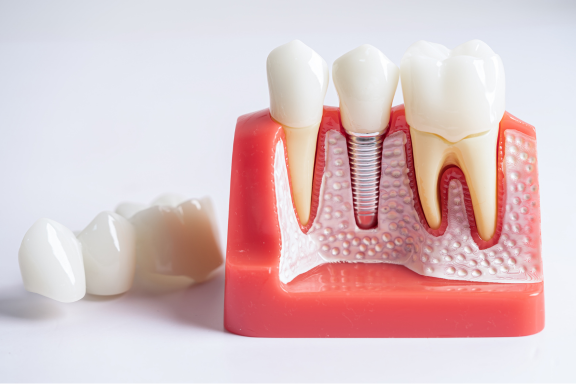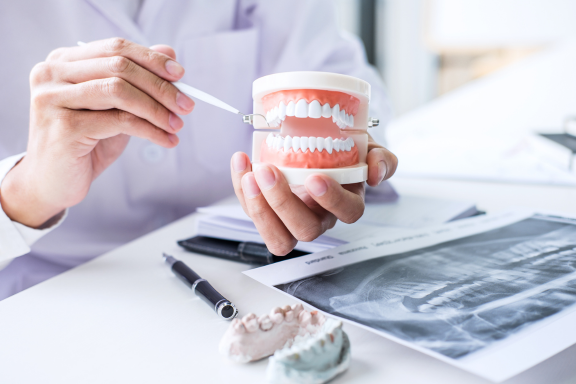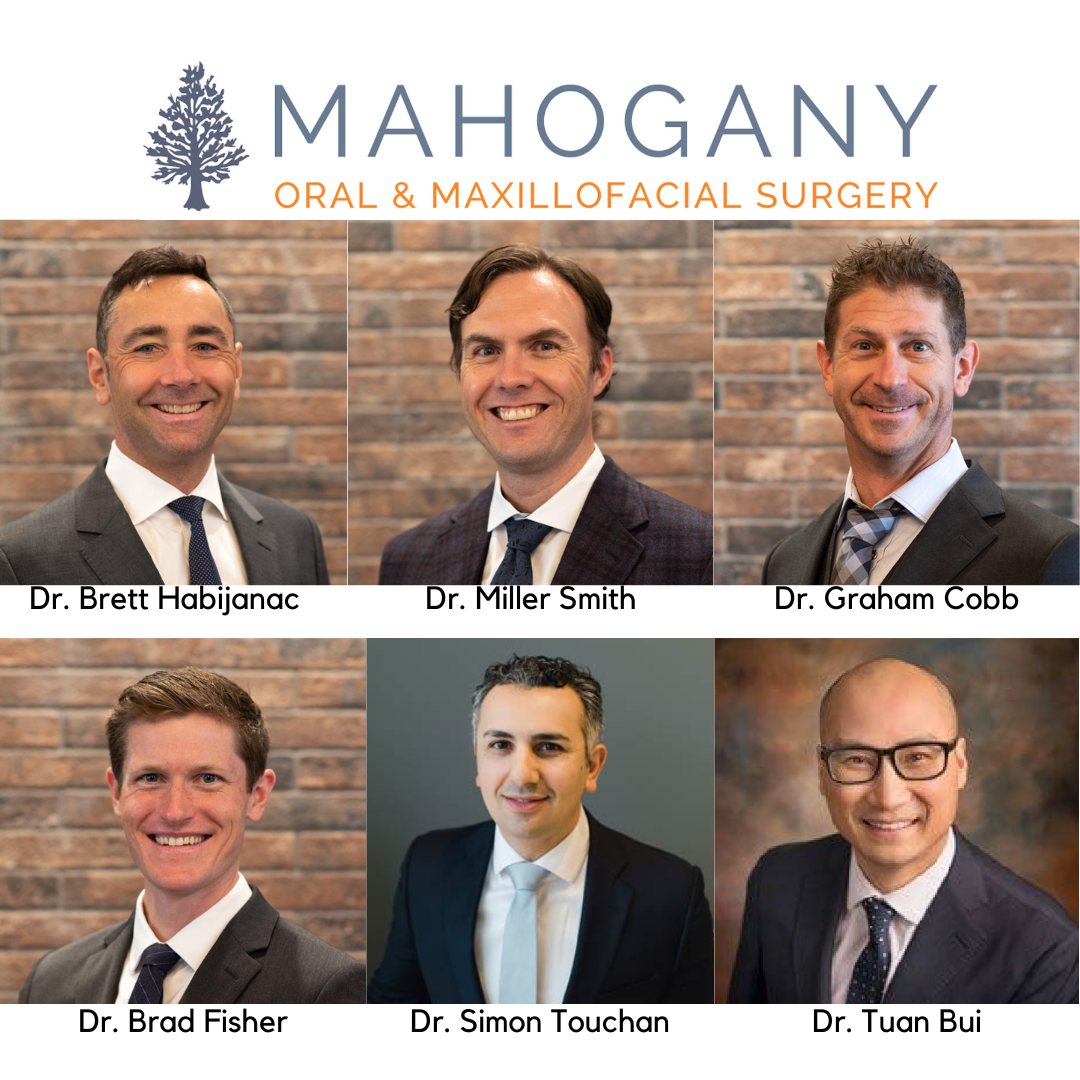


Imagine trying to build a house on a shaky foundation – it’s just not going to work out well in the long run. In the same way, ensuring your jawbone is strong and healthy is crucial for successful dental implants and overall oral health. That’s where a dental bone graft specialist comes in. In this blog, we’ll delve into when you might need a bone graft, why you should consider it, what the procedure involves, and why it’s advantageous to have it done by an oral surgeon.
We will also cover what dental bone graft surgery entails, including the administration of local anesthesia, making an incision in the gums to expose the jawbone, applying bone grafting material, and repositioning the gum tissue before closing the incision with stitches.
Understanding When You Need a Dental Bone Graft

There are several situations where you might need a dental bone graft. Often, it’s necessary when a patient wants dental implants, but their jawbone isn’t robust enough to support the implants. This lack of bone density can result from various factors:
- Tooth Loss: When you lose a tooth, the bone in that area begins to deteriorate. A missing tooth can lead to jaw bone loss, causing bone atrophy and potential issues with tooth shifting, changing facial structure, and complicating dental procedures like dental implants and dentures.
- Gum Disease: Advanced periodontal disease can erode the jawbone.
- Trauma or Injury: Accidents can damage both teeth and the supporting bone structure.
If you’re dealing with any of these issues, a dental bone graft specialist can help prepare your jaw for implants, ensuring a stable foundation for your new teeth. If you’ve experienced tooth loss or gum disease, schedule a consultation with a dental bone graft specialist to assess your bone density.
Why Consider a Dental Bone Graft?

Opting for a dental bone graft isn’t just about aesthetics; it’s about long-term oral health. Here are a few reasons why you should consider it:
- Support for Dental Implants: Implants need a strong bone to anchor into. Without sufficient bone, implants are more likely to fail.
- Prevent Further Bone Loss: Bone grafts can help maintain your jawbone’s structure and prevent further deterioration.
- Improve Facial Structure: Bone loss can lead to changes in your facial appearance, making you look older. A bone graft helps maintain your natural facial contours.
- Aesthetic, Preventive, and Reconstructive Functions: Dental bone grafts address bone loss, facilitate dental implant procedures, and prevent further oral health issues. They are essential for maintaining bone density and overall oral health.
Practical Tip: If you’re considering dental implants, ask your dental bone graft specialist about the benefits of bone grafting for long-term success.
What the Dental Bone Grafting Procedure Entails

Getting a bone graft might sound intimidating, but understanding the process can ease your concerns. Here’s a step-by-step look at what to expect:
- Preparations for Dental Bone Graft Placement: Before the placement of a dental bone graft, an oral examination and assessment of your teeth, gums, and jaw health will be conducted. Dental X-rays or scans are used to evaluate bone loss, and a personalized treatment plan is created based on your needs.
- Initial Consultation: Your dental bone graft specialist will evaluate your oral health and take X-rays to determine the extent of bone loss.
- Graft Material Selection: Bone grafts can be made from your own bone (autograft), a donor (allograft), or synthetic materials. Each type of bone graft material has its benefits and risks, and your specialist will help you choose the best option for your situation.
- Surgical Procedure: Under local anesthesia or sedation, the specialist will make an incision in the gum tissue to expose the jaw bone. The bone grafting material is then applied to repair the defect and is often covered with a membrane for added protection. The gum tissue is then repositioned and sutured to secure the graft.
- Healing Process: The bone graft will integrate with your natural bone over several months, creating a strong foundation for future dental work.
According to the American Academy of Periodontology, bone grafts have a high success rate, with most patients experiencing significant bone growth within a few months.
Practical Tip: Follow all post-surgery care instructions from your oral surgeon to ensure a smooth and successful healing process.
Advantages of Having Bone Grafting Done by an Oral Surgeon

Choosing an oral surgeon for your bone grafting procedure offers several distinct advantages:
- Expertise and Experience: Oral surgeons have specialized training in complex bone grafting procedures.
- Comprehensive Care: They can manage all aspects of the surgery, from initial consultation to post-operative care.
- Advanced Techniques: Oral surgeons stay updated on the latest advancements in dental technology and surgical techniques.
Always choose an experienced oral surgeon for your bone grafting procedure to ensure the best results.
Why Mahogany Oral Surgery is Your Best Choice

Located in Calgary, AB, Mahogany Oral Surgery is a premier choice for patients needing bone grafting. Here’s why:
- Experienced Team: Our team of oral surgeons is highly skilled and experienced in a wide range of oral surgical procedures, including bone grafting.
- State-of-the-Art Facility: We use the latest technology to ensure precise and effective treatments.
- Personalized Care: We tailor our treatment plans to meet the unique needs of each patient, ensuring comfort and satisfaction.
- Importance of Bone Grafts: After a tooth extraction, bone grafts are crucial to prevent bone loss and support dental implants, dentures, or other dental procedures.
Our practice, servicing SE and SW Calgary and surrounding communities, is dedicated to providing top-notch care in a friendly and professional environment.
Practical Tip: Contact Mahogany Oral Surgery for a consultation to discuss your bone grafting needs and how we can help restore your oral health.
Conclusion: Building a Strong Foundation for Your Oral Health

In summary, a dental bone graft is a crucial procedure for anyone needing dental implants or dealing with bone loss. By opting for a bone graft, you’re not just preparing for implants but also safeguarding your long-term oral health. Bone grafts play a vital role in supporting dental implants and ensuring their success. Trusting this procedure to a skilled oral surgeon, like those at Mahogany Oral Surgery, ensures you’re getting the best care possible.
Remember, a strong jawbone is the foundation for a healthy and beautiful smile. So, take the first step towards improved oral health by consulting a dental bone graft specialist today.
Your smile is a testament to your confidence and well-being. Don’t let bone loss hold you back – build a strong foundation for a lifetime of smiles with expert care from Mahogany Oral Surgery.
For more information or to schedule an appointment, call Mahogany Oral Surgery at
(403) 930-8189, or request an appointment online.


